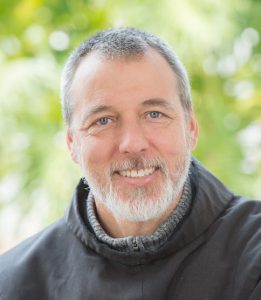
FROM RUSSIA WITH LOVE
FRIAR JOHN GIBBONS ON MISSION IN SIBERIA
Friar John Gibbons, a native of Beaverton, Oregon, was back in the USA recently to visit family and friends, and to seek donations for his work in Russia. For more than 13 years now, John has served as part of the international Franciscan (OFM) effort known as the Russian Foundation, for short, and is stationed in Siberia.
How is day-to-day parish life in Russia? Altogether we have about 100 parishioners in the two places we serve. The youngest is a year old and the oldest is 89. Our contact is more personal than it would be in the US. For example, parishioners think it’s perfectly normal that I should call on them twice a month to inquire about their health, whether they’ve been traveling, and so on. Or even to check in with them if someone doesn’t come to Mass.
Tell us something about their background as Catholics. For the older people, there were basically no churches or priests during the Soviet period. There was active persecution of people of all faiths. So most people in Russia lost their faith. Some of my parishioners are from families who—willingly or not– immigrated to Siberia from one of the Eastern Bloc countries, usually Poland or the Ukraine. Others, after perestroika, under Gorbachev, suddenly found out that it was okay to go to church again. Many of them began to listen to the longing in their hearts.
Tell us something about your local Franciscan community. We are an international community of three in Ussuriysk: Friar Stefano (Italy), Friar Kiprian (Poland), and myself (USA). We are all very different, but with good will and great patience we have formed a solid community. Stefano, 50, very ably directs our Tau homeless shelter. Kiprian, 34 connects well with the Russian young adults, and led a group to the World Youth Day in his native Poland in 2016. We pray and have Mass together daily. We also cook dinner for each other and occasionally go out for pizza together or to a free concert.
Can you tell us something about the homeless shelter? It was started because a number of people here were literally freezing to death on the streets. Under the Soviets, the authorities kept track of everyone; if you missed work, they would come to find you. But in the changing political environment, they weren’t especially involved in looking after addicts and alcoholics; the system had broken down. At the shelter, we can take up to 30 men overnight, and people come during the day as well. More women come during the day– for lunch and companionship.
What other kinds of help are you able to give people? We help people with their documents if they are stolen or lost. Without documents in Russia, you can’t get anything. We work to help people get their internal passport and with that they can start a new life. Retired people can begin to get a pension and live on their own, rent a little room somewhere. Disabled people can get on a waiting list for a home for invalids.
What have you enjoyed most about being in Russia? The Russian people. I have great friends there. I appreciate the genuine warmth once they get to know you. There is a greater depth of relationship than is typical in America. Americans are more careful about disclosing personal business. Russians tend to share on a deeper level; you go to your neighbors and friends when you have troubles.
Do you hope to stay longer in Russia? I’d like to stay at least a few more years. The Russian Foundation is at a critical moment now. We are just 14 friars here now; half of when I started. You have to be pretty patient and stubborn, persevering, and forgiving (to do well here). So far, I have the resilience for that, so I continue. I can pretty much keep smiling.
What would help Americans to understand Russian people better? The most important thing to realize is that they’re people like everyone else. They may have different priorities and values, but they want to live in peace, have a good family life, decent work, and have time to go to the beach in the summer just like we do.
What do you need personally? I ask for people’s prayers. That’s very important to me. We are isolated in Russia and Russia is isolated from the world in many ways. It’s still in its infancy, this revival of the Catholic faith there. Believers need to know that people elsewhere in the world haven’t forgotten them.

